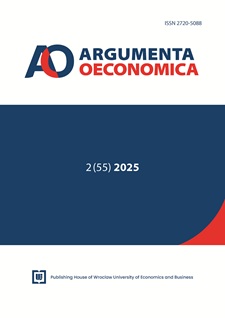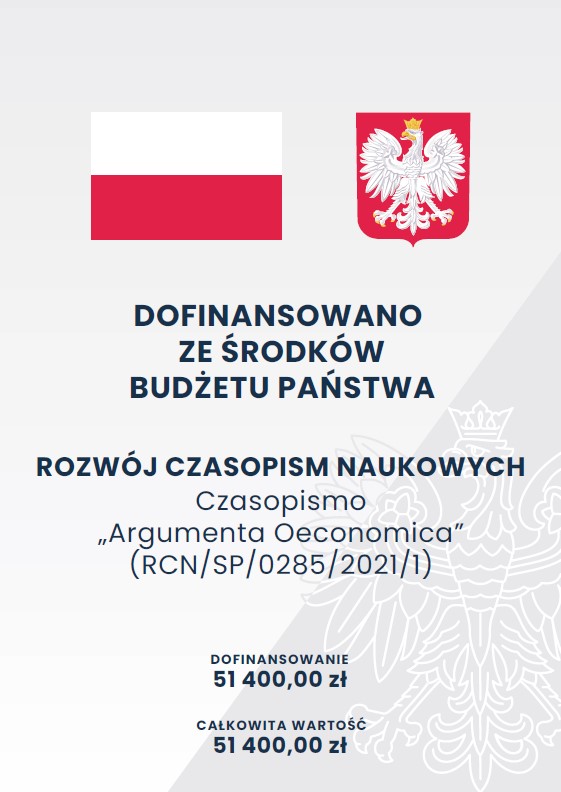Interactions between corporate governance, tourism growth,and corporate performance: the case of listed tourism companiesin Türkiye
DOI:
https://doi.org/10.15611/aoe.2025.2.10Keywords:
tourism, corporate governance, corporate performance, panel data, TürkiyeAbstract
Aim: This study evaluates interactions between corporate governance, tourism growth, and corporate performance concerning listed tourism companies.
Methodology: Panel econometric procedures, including regressions by least squares, fixed effects, random effects and causality analyses were followed using quarterly data ranging from 2013:Q1 to 2023:Q4.
Results: The results show that company-level corporate governance proxies and country-level tourism growth exert statistically significant effects on companies financial performance, with mixed directions of corporate governance’s impact. The panel causality test results exhibit two different unidirectional causalities that run (1) from company-level board size to company-level return on assets, and (2) from country-level tourism growth to company-level return on equity.
Implications and recommendations: The results reveal that tourism companies need to be encouraged to increase the number of tourists and the number of nights spent in order to achieve better corporate performance. As further research, determinants of leadership styles and their effects on financial performance would provide important clues about the management methods that should be implemented to improve competitiveness and performance.
Originality/value: Türkiye was selected as the sample, being one of the top tourist destinations, therefore the results of this study could be generalised for other major tourist destinations, especially those in the Mediterranean region. As far as research questions, econometric methodology, and data type are concerned, this study is the first of its kind to the best of the author’s knowledge.
Downloads
References
Achim, M. V., Borlea, S. N., & Mare, C. (2016). Corporate governance and business performance: Evidence for the Romanian economy. Journal of Business Economics and Management, 17(3), 458-474.
Adams, R. B., Hermalin, B. E., & Weisbach, M. S. (2010). The role of boards of directors in corporate governance: A conceptual framework and survey. Journal of Economic Literature, 48(1), 58-107.
Al-Abdallah, S. Y. S., Adous, S. M. M., Al-Momany, I. A. A., & Bouguerra, I. (2021). The Impact of Board of Directors Characteristics on Roe and Roa; An Analytical Study in Non-Financial Companies. Journal of Management Information and Decision Sciences, 24(S1), 1-9.
Al-Gamrh, B., Ku Ismail, K. N. I., Ahsan, T., & Alquhaif, A. (2020). Investment opportunities, corporate governance quality, and firm performance in the UAE. Journal of Accounting in Emerging Economies, 10(2), 261-276.
Al-Najjar, B. (2014). Corporate governance, tourism growth and firm performance: Evidence from publicly listed tourism firms in five Middle Eastern countries. Tourism Management, 42, 342-351.
Arsezen, P. (2017). An Analysis of the Relationship Between Workaholism Behavior in Tourism, Job Satisfaction, and Business Performance, and the Mediating Role of Emotional Commitment to the Organization: A Case Study of Managers in Five-Star Accommodation Enterprises in Antalya.
Balaguer, J., & Cantavella-Jordá, M. (2002). Tourism as a long-run economic growth factor: The Spanish Case. Applied Economics, 34(7), 877-884.
Baltagi, B. H. (1995). Econometric Analysis of Panel Data. John Wiley & Sons Ltd.
Bycio, P., Hackett, R. D., & Allen, J. S. (1995). Further assessments of Bass’s (1985) conceptualization of transactional and transformational leadership. Journal of Applied Psychology, 80, 468478.
Bzeouich, B., Lakhal, F., & Dammak, N. (2019). Earnings management and corporate investment efficiency: Does the board of directors matter? Journal of Financial Reporting and Accounting, 17(4), 650-670.
Chen, M. H. (2010). The economy, tourism growth and corporate performance in the Taiwanese hotel industry. Tourism Management, 31(5), 665-675.
Chung, C.-N., & Luo, X. (2008). Institutional logics or agency costs: The influence of corporate governance models on business group restructuring in emerging economies. Organization Science, 19(5), 766-784.
Dezső, C. L., & Ross, G. D. (2008). Girl Power, Female Participation in Top Management and Firm Performance. Robert H. Smith School Research Paper. Retrieved from http://ssrn.com/abstract=1088182
Douma, S., George, R., & Kabir, R. (2006). Foreign and domestic ownership, business groups, and firm performance: Evidence from a large emerging market. Strategic Management Journal, 27(7), 637-657.
Dristakis, N. (2004). Tourism as a long-run economic growth factor: An empirical investigation for Greece using causality analysis. Tourism Economics, 10(3), 305-316.
Dumitrescu, E.-I., & Hurlin, C. (2012). Testing for Granger Non-Causality in Heterogeneous Panels. Economic Modelling, 29, 1450-1460.
Ekonomik Kalkınma ve İşbirliği Örgütü (OECD). (2015). G20/OECD principles of corporate governance. Ankara.
Fernández, J. A. S., Martínez, J. M. G., & Martín, J. M. M. (2022). An analysis of the competitiveness of the tourism industry in a context of economic recovery following the COVID19 pandemic. Technological Forecasting and Social Change, 174, 121301.
Galletta, S., Mazzù, S., & Naciti, V. (2021). Banks’ business strategy and environmental effectiveness: The monitoring role of the board of directors and the managerial incentives. Business Strategy and the Environment, 30(5), 2656-2670.
García-Gómez, C. D., Demir, E., Chen, M. H., & Díez-Esteban, J. M. (2022). Understanding the effects of economic policy uncertainty on US tourism firms’ performance. Tourism Economics, 28(5), 1174-1192.
Goffi, G., Masiero, L., & Pencarelli, T. (2022). Corporate social responsibility and performances of firms operating in the tourism and hospitality industry. The TQM Journal, 34(6), 1626-1647.
Granger, C. W. J. (1969). Investigating causal relation by econometric models and crossspectral methods. Econometrica, 37, 427-438.
Granger, C. W. J., & Newbold, P. (1974). Spurious regressions in econometrics. Journal of Econometrics, 2(2), 111-120.
Greene, W. H. (2002). Econometric Analysis. (Fifth Edition). Prentice Hall.
Gregory, H. J., & Simms, M. E. (1999). Corporate Governance: What It Is And Why It Matters. 9th International Anti-Corruption Conference, Durban, South Africa.
Gujarati, D. N., & Porter, D. C. (2010). Econometrics. McGraw-Hill.
Gunduz, L., & Hatemi-J, A. (2005). Is the tourism-led growth hypothesis valid for Turkey? Applied Economics Letters, 12(8), 499-504.
Hyarat, H., Husin, N., & Jos, R. (2024). The impact of the board of directors on companies’ performance: The moderating role of ownership concentration. Journal of Governance and Regulation, 13(1), 241-252. https://doi.org/10.22495/jgrv13i1art22
Im, K. S., Pesaran, M. H., & Shin, Y. (2003). Testing for unit roots in heterogeneous panels. Journal of Econometrics, 115, 53-74.
Iwasaki, I. (2008). The determinants of board composition in a transforming economy: Evidence from Russia. Journal of Corporate Finance, 14(5), 532-549.
Jensen, M. C., & Meckling, W. H. (1976). Theory of the firm: Managerial behavior, agency costs and ownership structure. Journal of Financial Economics, 3(4), 305-360.
Kanca, O. C. (2015). Turizm Gelirleri ve Ekonomik Büyüme: Türkiye Örneği. Marmara Sosyal Araştırmalar Dergisi, 8, 1-14.
Katircioglu, S. T. (2009). Revisiting the Tourism-led-growth Hypothesis for Turkey Using the Bounds Test and Johansen Approach for Cointegration. Tourism Management, 30(1), 17-20.
Katircioglu, S. T. (2014). International Tourism, Energy Consumption, and Environmental Pollution: The Case of Turkey. Renewable & Sustainable Energy Reviews, 36, 180-187.
Kim, H. Y., Chen, M. H., & Jang, S. C. (2006). Tourism expansion and economic development: The case of Taiwan. Tourism Management, 27(5), 925-933.
Lee, C. C., & ve Chien, M. S. (2008). Structural breaks, tourism development and economic growth: Evidence from Taiwan. Mathematics and Computers in Simulation, 77(4), 358-368.
Levin, A., Lin, C. F., & Chu C. (2002). Unit root tests in panel data: Asymptotic and finite-sample properties. Journal of Econometrics, 108, 1-24.
Maddala, G. S., & Wu, S. (1999). A Comparative Study of Unit Root Tests with Panel Data and a New Simple Test. Oxford Bulletin of Economics and Statistics, 61, 631-652.
Marimuthu, M., & Kolandaisamy, I. (2009a). Can demographic diversity in top management team contribute for greater financial performance? An empirical discussion. Uluslararası Sosyal Araştırmalar ergisi (The Journal of International Social Research), 2(8), 273-286.
Marimuthu, M., & Kolandaisamy, I. (2009b). Demographic diversity in top level Management and its implication on firm financial performance: An empirical discussion. International Journal of Business and Management, 4(6), 176-188.
Menteş, S. A. (2011). An analysis on relationship between board size and firm performance for Istanbul Stock Exchange (ISE) National Manufacturing Index Firms. Namık Kemal Üniversitesi Sosyal Bilimler Enstitüsü Sosyal Bilimler Metinleri 3, 1-21.
Ongan, S., & Demiroz, D. M. (2005). The contribution of tourism to the long-run Turkish economic growth. Ekonomický časopis/Journal of Economics, 53(9), 880-894.
Pfeffer, J. (2019). Size and composition of corporate boards of directors: The organization and its environment. In R. I. Tricker (Ed.), Corporate Governance (pp. 53-64). Gower.
Proenca, S., & Soukiazis, E. (2008). Tourism as an economic growth factor: A case study for Southern European countries. Tourism Economics, 14(4), 791-806.
Public Disclosure Platform (2024). Data Services. Retrieved January 20, 2024 from https://www.mkk.com.tr/en/corporate-governance-services/pdp-public-disclosure-platform
Riaz, A., & Haider, M. H. (2010) Role of transformational and transactional leadership on job satisfaction and career satisfaction. Business and Economic Horizons, 1, 29-38.
Saito, R., & Dutra, M. G. L. (2006). Boards of directors of publicly-held companies in Brazil: Profile and implications for minority shareholders. Corporate Governance, 14(2), 98-106.
Seetanah, B. (2011). Assessing the Dynamic Economic Impact of Tourism for Island Economies. Annals of tourism research, 38 (1), 291-308.
Topçuoğlu, Ö., & ve Bozkurt, E. (2013). Türkiye’de Ekonomik Büyüme ve Turizm İlişkisi. Gümüşhane Üniversitesi Sosyal Bilimler Enstitüsü Elektronik Dergisi, 4(7), 91-105.
Türkcan, B. (2018). Türkiye’de İç Turizm Harcamaları ile Ekonomik Büyüme İlişkisi. Efil Journal, 1(1), 158-171.
Turkish Statistical Institute (2024). Statistical Data Portal. Retrieved January 25, 2024 from https://data.tuik.gov.tr/Kategori/GetKategori?p=Ticaret-ve-Hizmet-115
UNWTO. (2023). Tourism Data & Statistics. Retrieved December 20, 2023, from http://www.unwto.org
Wooldridge, J. M. (2013). Introductory Econometrics: A Modern Approach. (Fifth Edition). Cengage Learning.
Wright, M., Filatotchev, I., Hoskisson, R. E., & Peng, M. W. (2005). Strategy research in emerging economies: Challenging the conventional wisdom. Journal of Management Studies, 42(1), 1-33.
Young, M. N., Peng, M. W., Ahlstrom, D., Bruton, G. D., & Jiang, Y. (2008). Corporate governance in emerging economies: A review of the principle-principle perspective. Journal of Management Studies, 45(1), 196-220.
Downloads
Published
License
Copyright (c) 2025 Setareh Katircioglu, Mehmet Oguzhan Ilban, Sevgi Sezer, Mehmet Tahsin Liceli

This work is licensed under a Creative Commons Attribution-ShareAlike 4.0 International License.
Accepted 2024-11-14
Published 2025-09-30








